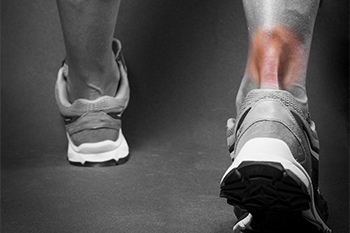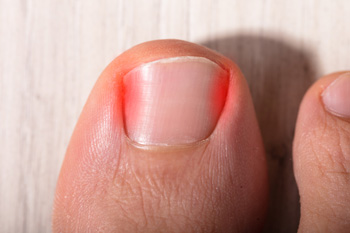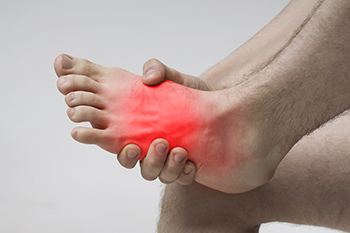Connect With Us
Blog
Items filtered by date: July 2022
An Achilles Tendon Injury May Be More Common Among Men

The medical term for the part of the foot that is known as the Achilles tendon is referred to as the calcaneal tendon. It is located in the back of the calf, and connects the heel to the calf muscles. It is considered to be the largest tendon in the body, and is responsible for pointing and flexing the foot. A foot mishap may result in an Achilles tendon injury, and this often causes severe pain and discomfort. This tendon could partially tear, and in the worse case scenario, may completely rupture. It can happen to people who enjoy the sport of running, and increasing the mileage and speed too soon may result in this type of injury. It is common among men who choose to participate in certain sporting activities during time off from work, and their bodies may not be used to twisting and turning, and the Achilles tendon may become injured. The symptoms that are generally associated with this condition include swelling, the inability to stand, and there may be a popping noise at the time of the injury. For a ruptured Achilles tendon, surgery may be necessary to repair the foot so daily activities can resume. If you have injured your Achilles tendon, please consult with a podiatrist who can guide you toward the best treatment options for you.
Achilles tendon injuries need immediate attention to avoid future complications. If you have any concerns, contact Imaze Marian Davis, DPM of Marian Davis, DPM, PA. Our doctors can provide the care you need to keep you pain-free and on your feet.
What Is the Achilles Tendon?
The Achilles tendon is a tendon that connects the lower leg muscles and calf to the heel of the foot. It is the strongest tendon in the human body and is essential for making movement possible. Because this tendon is such an integral part of the body, any injuries to it can create immense difficulties and should immediately be presented to a doctor.
What Are the Symptoms of an Achilles Tendon Injury?
There are various types of injuries that can affect the Achilles tendon. The two most common injuries are Achilles tendinitis and ruptures of the tendon.
Achilles Tendinitis Symptoms
- Inflammation
- Dull to severe pain
- Increased blood flow to the tendon
- Thickening of the tendon
Rupture Symptoms
- Extreme pain and swelling in the foot
- Total immobility
Treatment and Prevention
Achilles tendon injuries are diagnosed by a thorough physical evaluation, which can include an MRI. Treatment involves rest, physical therapy, and in some cases, surgery. However, various preventative measures can be taken to avoid these injuries, such as:
- Thorough stretching of the tendon before and after exercise
- Strengthening exercises like calf raises, squats, leg curls, leg extensions, leg raises, lunges, and leg presses
If you have any questions please feel free to contact our office located in Miami, FL . We offer the newest diagnostic tools and technology to treat your foot and ankle needs.
Surgery for Ingrown Toenails

Ingrown toenails are unattractive and potentially uncomfortable foot ailments that primarily affect the big toenail. They occur when the side of the nail essentially grows into the skin of the toe. As a result, the affected area can swell, turn red, and become inflamed. There are many cases of ingrown toenails that, if caught early enough, can be treated and taken care of at home. Other cases can be addressed by a podiatrist with antibiotics or a splint and will not require surgery. However, if a case is severe enough and the ingrown toenail has become infected, then a surgery might be necessary to remedy the situation. There are a number of surgical procedures a doctor may perform. First, a doctor may perform a wedge resection (also known as a partial nail avulsion), in which a portion of the toenail causing the problem is removed. A doctor may also perform a toenail removal (or a complete nail plate avulsion) where the entire affected nail is removed. The intention behind this procedure is that the new nail will grow back correctly in 18 months. Of course, each patient’s potential to benefit from surgery for an ingrown toenail is highly individualized. As a standard rule of thumb, you can always consult with your podiatrist to determine the best treatment plan for your ingrown toenail.
Ingrown toenails can become painful if they are not treated properly. For more information about ingrown toenails, contact Imaze Marian Davis, DPM of Marian Davis, DPM, PA. Our doctors can provide the care you need to keep you pain-free and on your feet.
Ingrown Toenails
Ingrown toenails occur when a toenail grows sideways into the bed of the nail, causing pain, swelling, and possibly infection.
Causes
- Bacterial infections
- Improper nail cutting such as cutting it too short or not straight across
- Trauma to the toe, such as stubbing, which causes the nail to grow back irregularly
- Ill-fitting shoes that bunch the toes too close together
- Genetic predisposition
Prevention
Because ingrown toenails are not something found outside of shoe-wearing cultures, going barefoot as often as possible will decrease the likeliness of developing ingrown toenails. Wearing proper fitting shoes and using proper cutting techniques will also help decrease your risk of developing ingrown toenails.
Treatment
Ingrown toenails are a very treatable foot condition. In minor cases, soaking the affected area in salt or antibacterial soaps will not only help with the ingrown nail itself, but also help prevent any infections from occurring. In more severe cases, surgery is an option. In either case, speaking to your podiatrist about this condition will help you get a better understanding of specific treatment options that are right for you.
If you have any questions please feel free to contact our office located in Miami, FL . We offer the newest diagnostic and treatment technologies for all your foot and ankle needs.
Mitigating the Effects of High Heels

Before leaving for a night out or preparing for a fancy event, many women will choose to complete their outfit by wearing a fashionable pair of high heels. Although such footwear is undoubtedly chic and visually striking, it can also cause serious and lasting damage to your feet. For example, when wearing a pair of high heels, one’s Achilles tendon tightens and shrinks, which can be painful and strain the lower leg muscles. In the long term, wearing these shoes for an extended period of time can even contribute to plantar fasciitis, a troublesome foot ailment. Although high heels can certainly pose a serious threat to the health of your feet, there are steps you can take to mitigate the detrimental effects of high heels. First, if you must wear high heels for an event, try to reduce the amount of time that you wear them. You might try waiting to put on your shoes until just before leaving and taking them off after approximately four hours at most. Second, if you must wear high heels, try to select a pair that offers a lower heel (i.e. an inch and a half). You might also try to find heels that are wider or chunkier, as these kinds of heels are more stable and won’t place too much pressure on your feet. Selecting the right kind of high heels and wearing them properly are a critical component of the health of your feet. For more information about high heels, contact a podiatrist.
High heels have a history of causing foot and ankle problems. If you have any concerns about your feet or ankles, contact Imaze Marian Davis, DPM from Marian Davis, DPM, PA. Our doctors can provide the care you need to keep you pain-free and on your feet.
Effects of High Heels on the Feet
High heels are popular shoes among women because of their many styles and societal appeal. Despite this, high heels can still cause many health problems if worn too frequently.
Which Parts of My Body Will Be Affected by High Heels?
- Ankle Joints
- Achilles Tendon – May shorten and stiffen with prolonged wear
- Balls of the Feet
- Knees – Heels cause the knees to bend constantly, creating stress on them
- Back – They decrease the spine’s ability to absorb shock, which may lead to back pain. The vertebrae of the lower back may compress.
What Kinds of Foot Problems Can Develop from Wearing High Heels?
- Corns
- Calluses
- Hammertoe
- Bunions
- Morton’s Neuroma
- Plantar Fasciitis
How Can I Still Wear High Heels and Maintain Foot Health?
If you want to wear high heeled shoes, make sure that you are not wearing them every day, as this will help prevent long term physical problems. Try wearing thicker heels as opposed to stilettos to distribute weight more evenly across the feet. Always make sure you are wearing the proper shoes for the right occasion, such as sneakers for exercising. If you walk to work, try carrying your heels with you and changing into them once you arrive at work. Adding inserts to your heels can help cushion your feet and absorb shock. Full foot inserts or metatarsal pads are available.
If you have any questions please feel free to contact our office located in Miami, FL . We offer the newest diagnostic and treatment technologies for all your foot and ankle needs.
Why Live with Pain and Numbness in Your Feet?
Common Causes of Foot Pain

Nearly half of adults in the United States have some type of foot pain. This is to be expected, as we are on our feet so much of the time in our day-to-day lives. Sometimes it’s as simple as wearing different shoes, or wearing the proper shoe for the activity you are doing. However, when pain is not only frequent, but also persistent, it’s a good idea to see a podiatrist for help. The main causes of reported foot pain are tarsal tunnel syndrome, arthritis, plantar fasciitis, ingrown toenails, bunions, and corns and calluses. Tarsal tunnel syndrome is caused by a pinched nerve that starts in the big toe. The pain then moves through the foot to the ankle and can advance into the lower leg. Arthritis is an inflammatory disease that affects the joints, many of which are in the foot and ankle. Plantar fasciitis is an overuse injury affecting a band of tissue on the sole of the foot, resulting in heel pain. An ingrown toenail occurs then the toenail grows into the skin, often the result of tight shoes or improper footcare. Bunions are a bone deformity, usually at the base of the big toe, that affects the gait and can cause other foot problems. Corns and calluses are areas of hardened skin that can become extremely painful as they rub against the inside of a shoe. A podiatrist is able to help with each of these conditions, examining your feet and offering appropriate treatment options.
Foot Pain
Foot pain can be extremely painful and debilitating. If you have a foot pain, consult with Imaze Marian Davis, DPM from Marian Davis, DPM, PA. Our doctors will assess your condition and provide you with quality foot and ankle treatment.
Causes
Foot pain is a very broad condition that could be caused by one or more ailments. The most common include:
- Bunions
- Hammertoes
- Plantar Fasciitis
- Bone Spurs
- Corns
- Tarsal Tunnel Syndrome
- Ingrown Toenails
- Arthritis (such as Gout, Rheumatoid, and Osteoarthritis)
- Flat Feet
- Injury (from stress fractures, broken toe, foot, ankle, Achilles tendon ruptures, and sprains)
- And more
Diagnosis
To figure out the cause of foot pain, podiatrists utilize several different methods. This can range from simple visual inspections and sensation tests to X-rays and MRI scans. Prior medical history, family medical history, and any recent physical traumatic events will all be taken into consideration for a proper diagnosis.
Treatment
Treatment depends upon the cause of the foot pain. Whether it is resting, staying off the foot, or having surgery; podiatrists have a number of treatment options available for foot pain.
If you have any questions, please feel free to contact our office located in Miami, FL . We offer the newest diagnostic and treatment technologies for all your foot care needs.


